HEART Fellows Bring Unique Insights to Homelessness Research at UC San Diego
Lived experiences of the formerly unhoused add depth and breadth to sweeping study
Published Date
Story by:
Media contact:
Topics covered:
Share This:
Article Content
Frank Kensaku Saragosa knows the isolation, uncertainty and averted gaze of strangers that come with life on the streets of downtown San Diego. He has slept on sidewalks, weathered rainstorms without a roof over his head and relied on soup kitchens for sustenance.
Saragosa is now a HEART (Homelessness Experienced Action Researcher Training) Fellow, one among a cohort of six formerly unhoused county residents who are working alongside faculty, staff, postdoctoral fellows and undergrads at the UC San Diego Homelessness Hub.
Together, they are conducting research into the causes and consequences of homelessness and helping to identify solutions for a problem that has only worsened over the last decade. The annual point-in-time tally of the unhoused conducted throughout San Diego County in January 2024 found a record high of 10,605 people without a place to call their own, compared to the previous year’s count of 10,264.
Centered in the Department of Urban Studies and Planning in the School of Social Sciences, the Homelessness Hub was established in 2022 with generous support from campus friends Hanna and Mark Gleiberman, Phyllis and Dan Epstein, and Julie Bronstein. Research partners include the Regional Task Force on Homelessness, service providers, homelessness advocates and other stakeholders.
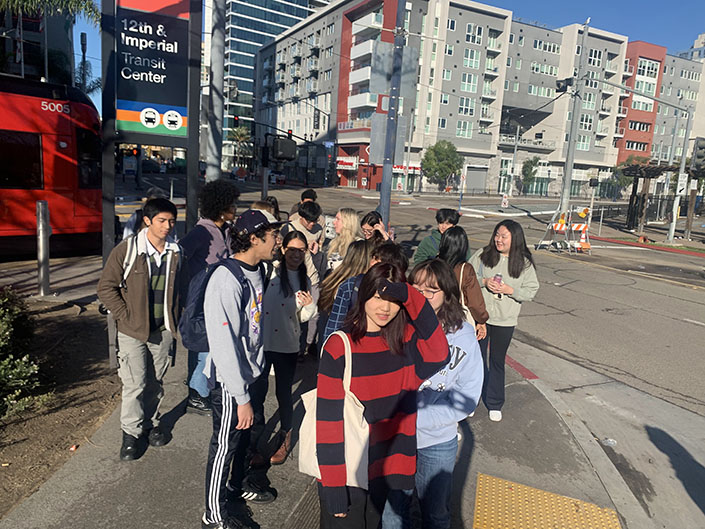
Leslie Lewis, the Homelessness Hub’s director of education and community engagement, as well as a continuing lecturer in the Department of Urban Studies and Planning and a doctoral alum of the Department of Anthropology at UC San Diego, came up with the idea of HEART Fellows as a way of incorporating the voices of those with lived experience of homelessness into every phase of research. The fellowship is also supported by a grant by the Yankelovich Center for Social Science Research.
“The HEART Fellows bring perspectives and bodies of knowledge that complement our own and enrich the research. They think of questions that we don’t think of. They also act as connectors and trust bridges to the broader community of people experiencing homelessness in San Diego. This collaborative approach moves us towards greater research justice and democracy and makes our research more impactful.”
For the first few months, HEART Fellows participate in weekly training facilitated by Lewis and Stacey Livingstone, a doctoral alum of the Department of Sociology at UC San Diego who is currently a postdoctoral fellow at the Homelessness Hub.
The training begins with a grounding in the historical, structural and cultural roots of mass homelessness and goes on to connect individual causes of homelessness with upstream causes such as lack of affordable housing and income disparities. The group then explores the range of interventions, learns about research methods, documents its own process with autoethnography, using photos, narrative and discussion.
The HEART Fellows put in four hours a week in the initial training period of the fellowship. Their work increases to 10 hours each week in the later stages of research. In line with the Homelessness Hub's philosophy of democratizing the research process, Livingstone said, they are paid an hourly stipend that’s on par with the compensation received by graduate student researchers at UC San Diego.
We are building a learning community here, one in which each individual feels like and is a valued, contributing member.
As co-researchers at the Homelessness Hub, HEART Fellows are participating in a large-scale, comprehensive evaluation of services for the unhoused in the region, an initiative that has received support from the Del Corazón Foundation, Elaine Galinson and Ed Fong ’75.
They are building case studies that examine barriers to meeting the services and shelter needs of subpopulations of people experiencing homelessness, including older adults, veterans, Black, Indigenous and other San Diegans of color, people with significant health challenges, people with substance use disorders and criminal justice involvement, survivors of domestic violence, refugee and immigrant families, and LGBTQ-identifying transitional age youth.
“Their perspectives are particularly valuable in building out these case studies,” Lewis said.
As they make contributions to the Homelessness Hub, HEART Fellows are also benefiting from their participation as co-researchers, Lewis said.
“We are building a learning community here, one in which each individual feels like and is a valued, contributing member. Their roles as university-affiliated researchers will help shift public perceptions of who people with lived experience of homelessness are and what they are able to accomplish.”
While incorporating the voices of lived experience is becoming an increasingly commonplace practice in the investigation of societal issues, the UC San Diego Homeless Hub has elevated the practice to a new level with the HEART Fellowship, said Livingstone.
“What’s really important about the HEART Fellowship is that it’s trying to have the full participation of people with lived experience in the entire research process. They are engaged at every step. They all bring such a rich background. We are demonstrating that expertise can exist in different places.”
Meet the Homelessness Hub’s HEART Fellows.
A commitment to help others
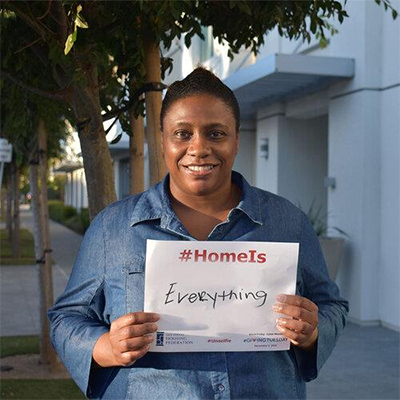
Chelees Turner came on board as a HEART Fellow to make her personal experiences with homelessness count toward a solution for the crisis.
The single mother found herself without a home at a particularly vulnerable time for her family. She had quit her job to care for her 4-year-old daughter, Ashani Riley, who was diagnosed with rhabdomyosarcoma, a rare type of cancer that affects soft tissue or muscle tissue. With no income, Turner, 42, was unable to pay rent for her City Heights apartment.
She had many pressing worries but the topmost among them was finding a place for her daughter to sleep when she was out of the hospital. Turner began to count on the kindness of cousins and other extended family for Ashani’s nighttime shelter. She lost her daughter to cancer in 2008.
“Ever since that happened, I have always been advocating for the homeless. I know what it’s like to be out there. What I went through was very traumatic and I want to share my experience with whoever is listening.”
Turner has become a passionate advocate for people experiencing homelessness. In her training sessions as a HEART Fellow, she is gaining valuable information that enables her to assist others who find themselves without a roof over their heads. She volunteers her time in various organizations that assist the unhoused and is helping some family members who are experiencing homelessness. She went back to school to receive her college degree. She and her 10-year-old son have a stable home, thanks to the Section 8 housing voucher program.
“I have a lot of respect for people who legitimately try to advocate and combat the problem of homelessness,” she said. "The UC San Diego Homelessness Hub is one of them.”
Passion and purpose
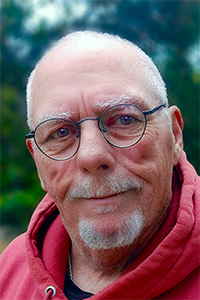
When Dennis Larkin lost his wife, he was enveloped by intense grief and hopelessness.
“I did not deal with it well,” said Larkin, 73, previously a founder of a 100-bed treatment center for people with drug and alcohol addictions. “I walked away from everything. I wanted to die”
After three years of itinerant existence that took him all over the country, Larkin, an Orange County native, came to San Diego. A police officer he met in an overnight safe parking lot directed him to Father Joe’s Villages where he found medical care for his injured leg and temporary shelter. He secured permanent housing in Talmadge where he has lived for the last five years.
An accomplished artist, Larkin has found ways to support unsheltered artists by teaching them art techniques. Through ARToutREACH, a nonprofit that he has founded, he helps them build financial stability by selling their work. Larkin represents the interests of the unhoused as a member of various nonprofits including the HEAL Network, Lived Experience Advisers and Shared Housing Board.
As a HEART fellow, Larkin has found a community of people who share his passion to find a solution for moving people off the streets and into homes.
“I am getting to hang around a pretty incredible group of people. I want to be a good researcher. I bring to the Homeless Hub my desire to change the public perception of what homelessness is in general. The resiliency and strength of the people who are surviving out here on the streets is remarkable. If we can lift them up, give them a chance, our society has no idea about the changes they are capable of.”
The voice of experience
Stella Brown prefers to not use her real name in order to protect the privacy of her family. She has a 15-year-old son who is thriving in school, and excelling in sports and other extracurricular activities. She said she doesn't want the stigma of being formerly homeless to follow them into the communities where they are building a new life together.
Brown comes from a family that has been in San Diego since the 1850s. She is a graduate of San Diego State University and has previously worked as a full-time elementary school teacher for the San Diego Unified School District. She had to flee the Lakeside home where she had lived for 20 years because of domestic violence. “I took my clothes off the clothesline and left. I did not go back because the threat of further and worsening violence was still there.”
For the three years when she was without a home, Brown lived in her car and occasionally stayed with family. Compounding the trauma of being unhoused was her health condition that still requires her to be hospitalized frequently and take daily medication to stay alive, she said.
The people I met on the streets were complex human beings doing their best in very difficult circumstances. We are all so much more than the problems we’re facing.”
During her quest for low income housing, Brown went from one assistance agency to another, putting her name on every waitlist she could find. Eventually, she received permanent supportive housing in Escondido. However, she is unable to live there due to unresolved issues with mold, she said. While she awaits a housing choice voucher, an assistance program to help people with very low-income, she spends most of her time in Oceanside caring for her elderly parents, raising her teenage son and helping out with her grandchildren.
“I spent many years in very poor health. Since being diagnosed correctly and treated with the proper medication, I am trying to live my best life and provide all the opportunities I can for my son as long as I am able to do so.”
Being a HEART Fellow at the Homelessness Hub has given Brown the opportunity to harness her own experiences of being unhoused to help others in the same situation. “I have experience in all the categories they have been researching,” said Brown, referring to the Homelessness Hub’s areas of focus. “Hopefully everything I know will not go to waste, maybe it will help somebody else.”
Rebounding with resilience
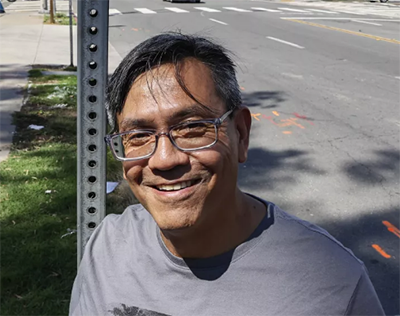
Frank Kensaku Saragosa, 57, was living on the streets of downtown San Diego’s East Village when the pandemic hit. Almost overnight, the places he counted on for food, clothing and shower facilities shut their doors. The same was true of most social services. With the Covid-related closure of public library branches, he lost access to computers.
“It left a lot of us high and dry,” said Saragosa, a former tenured professor of American Literature who has struggled with drug and alcohol addictions for most of his adult life. “I was scared, desperate, and I ended up doing things that landed me in federal prison.”
He served two and a half years in prison for drug smuggling across the border. “I came to realize in prison that this is a crime for which many unhoused people are recruited here in San Diego, and for which many of us serve considerable amounts of time.”
While in prison, Saragosa began to write about his life experiences as a way to deal with recurring flashbacks of his past traumas. His work won first place in the prestigious PEN America Prison Writing Awards.
Since his release from custody in August 2022, Saragosa has lived in Carlsbad in permanent supportive housing, a type of low-income housing that provides rental assistance and support services to help people achieve housing stability. He has immersed himself in his creative pursuits. His fiction, describing life on the streets in downtown San Diego, has been anthologized, and he is completing a novel based on his experiences on the streets. He and a collaborator have won a fellowship from Columbia University to create a play based on interviews with people who have experienced homelessness.
Becoming a HEART Fellow has allowed Saragosa to work toward shifting public narratives around housing and homelessness, a part of his commitment to center the perspectives of the people who experience poverty and homelessness in public discourse.
“When people see homelessness, they see the squalor, they see the pathology," Saragosa said. "They don’t see people, they see problems. The people I met on the streets were complex human beings doing their best in very difficult circumstances. We are all so much more than the problems we’re facing.”
Saragosa is proud of his work as a HEART Fellow. “I love the Homelessness Hub because they are really trying to honor different ways of knowing – there is academic knowledge, sociological research, economic research, public health research, and there’s lived experience. All these dimensions give a much better picture of homelessness.”
Community and collaboration
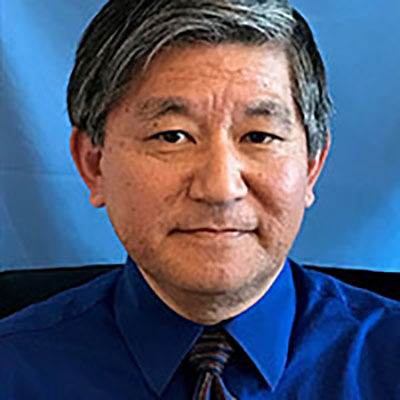
Kuni Stearns, 57, is a long-time San Diego resident who has held jobs in hospitality and as a census enumerator. He mirrors the experience of many people who find themselves without shelter — he lost his home when his income fell short of what he needed to make ends meet.
Having depleted most of his savings, Stearns lived in his car, moving from one safe space to another. During the pandemic, he stayed briefly at the San Diego Convention Center that was converted to a temporary shelter for the unhoused. All the while, he worked three jobs and was eventually able to find a rental home.
Since then, Stearns has spent countless hours advocating for those without a roof over their heads.
From homelessness to healing
For Kassandra, 58, a retired health care operations manager, the hardships of homelessness became exacerbated during the pandemic. She had great difficulty in finding a shelter that welcomed dogs.
“The lack of support was very disheartening. I had to become my own advocate to find the resources to help myself and others,” said the HEART Fellow who prefers not to use her real name.
Today, Kassandra finds herself in a much better place with the painful chapters of her life — domestic violence, a bad divorce, and homelessness — behind her. She has found housing in a senior community in North Park. She is a full-time student at San Diego City College working toward her degree in social work. A published poet, she frequently presents her work at spoken word events.
Kassandra has launched her own nonprofit to help the unsheltered and has forged connections with advocacy groups for the unhoused. At the UC San Diego Homelessness Hub, she has a supportive community that mirrors her determination to help those undergoing the hardships of life without shelter.
“I am learning to be empowered,” she said. “I am learning to be inspired by all these people I have met. I connect with them. I bond with them. We share resources. I am very grateful.”
Meet a member of the Community Advisory Board
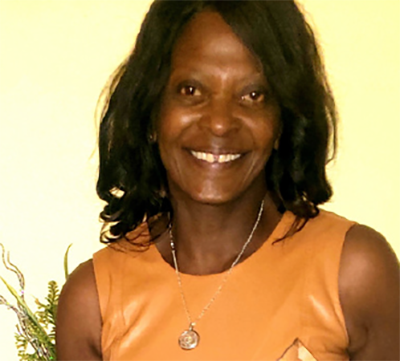
In her undergraduate studies at San Diego City College, Amelia Broadnax often wondered about the value of her statistics class. She’s realizing its importance today in her role as a member of the Homelessness Hub's Community Advisory Board.
“I say thank you Lord that I at least got a C out of the class,” Broadnax, 59, said with a laugh. “I can understand today why statistics are so important, why research is so important, why it is so important to actually have people who have experienced homelessness to be able to talk to the researchers when they are crafting the questions so that it makes sense for the person hearing the questions.”
Broadnax is a native of Oakland, CA and retired from her job as a materials handler with the EPA. Her experiences with clinical depression, homelessness and eight-month incarceration have put her in a unique position to contribute to the work of the UC San Diego Homelessness Hub. Today, she owns and operates a nonprofit that provides transitional and permanent housing to the unsheltered.
“My goal is to help create the most conducive study to understand the fundamentals of homelessness. It’s not just a person without a place to stay. It’s a person who feels they are without dignity.”
Topics covered:
Share This:
You May Also Like
Engineers Take a Closer Look at How a Plant Virus Primes the Immune System to Fight Cancer
Technology & EngineeringStay in the Know
Keep up with all the latest from UC San Diego. Subscribe to the newsletter today.




